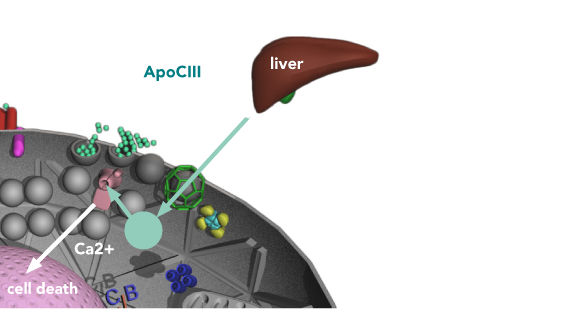Diabetogenic serum factor apoCIII

ApoCIII is produced by liver and reaches beta-cells via blood. On contact with beta-cells, apoCIII activates calcium channels (pink barrels) to allow more calcium ions flow into the cells. Too high amount of calcium ions have a toxic effect and leads to gradual beta-cell death.
.
.
.
Apolipoprotein CIII has pro-inflammatory effects
Apolipoprotein CIII (apoCIII) is a protein produced primarily in the liver. ApoCIII plays a key role in lipid metabolism. It has also been found to be a pro-inflammatory factor thereby increasing the risk for cardiovascular diseases.
Increased levels of apoCIII induce beta-cell death
Calcium is very important for a normal function of insulin-secreting beta-cells. Serum from type 1 diabetes patients has been found to increase the activity of calcium channels in beta cells, resulting in increased concentration of calcium and beta-cell death. The factor in serum responsible for this effect has been identified to be apoCIII.
Diabetic patients have higher levels of apoCIII
Insulin decreases the production of apoCIII. In patients with type 1 diabetes the insulin-producing beta-cells are destroyed by an inincreased level of apoCIII. It has also been shown that insulin resistance where the sensitivity for the hormone is reduced, seen in many patients with obesity and type 2 diabetes, impairs the regulation of apoCIII resulting in increased levels of the apolipoprotein.
People with decreased levels of apoCIII are healthier and live longer
There are people who, due to a change in the apoCIII gene, have a lifelong reduction of apoCIII and they have a favorable pattern of lipids, increased insulin sensitivity, lower incidence of hypertension, cardiovascular diseases and live longer.
Reducing apoCIII is a therapeutic target in the treatment of diabetes
BB-rats develop a human-like type 1 diabetes. When apoCIII production in these animals was lowered by antisense treatment, the onset of diabetes was significantly delayed. Researchers at Biocrine are now in progress with the development of a specific therapy aiming at lowering apoCIII. For example monoclonal antibodies, that are already in use for treatment of other diseases like rheumatoid arthritis and multiple sclerosis and give a more controlled effect compared to antisense. The utmost aim is to develop tools to safely reduce apoCIII in individuals at risk for diabetes.

Lisa Juntti-Berggren.
.Read more about apoCIII:
- Apolipoprotein CIII hyperactivates beta cell Cav1 channnels through ST-BI/beta1 integrin-dependent coactivation of PKA and Src. Shi Y, Yang G, Yu J, Yu L, Westenbroek R, Catterall WA, Juntti-Berggren L, Berggren PO, Yang SN. Cell Mol Life Sci. 2013 Aug 15
- Lowering apolipoprotein CIII delays onset of type 1 diabetes. Holmberg R, et al. Proc Natl Acad Sci U S A. 2011 June;108(26):10685-9
- Apolipoprotein CIII promotes Ca2+-dependent beta cell death in type 1 diabetes. Juntti-Berggren L, et al. Proc Natl Acad Sci U S A. 2004 Jul 6;101(27):10090-4.
- Increased activity of L-type Ca2+ channels exposed to serum from patients with type I diabetes. Juntti-Berggren L, et al., Science. 1993 Jul 2;261(5117):86-90.
- Apolipoprotein CIII reduces proinflammatory cytokine-induced apoptosis in rat pancreatic islets via the Akt prosurvival pathway. J Störling et al., Endocrinology 152: 3040-3048, 2011.
- Apolipoprotein CIII links islet insulin resistance to β-cell failure in diabetes. K Åvall et al., Proc Natl Acad Sci USA 112: E2611-E2619, 2015.
- The pancreatic β-cell in deadly encounter with apolipoprotein CIII. L Juntti-Berggren et al., Cell Cycle 14: (17):2715-2716, 2015.
- Apolipoprotein CIII is a new player in diabetes. L Juntti-Berggren et al., Curr Opin Lipidol 28: 27-31, 2017.
- The yin and yang of apolipoprotein CIII. K Åvall et al., Diabetes Metab 44: 303-304, 2018.
- Lowering apolipoprotein CIII protects against high-fat diet-induced metabolic derangements. Valladolid-Acebes I, Åvall K, Recio-Lopez P, Moruzzi N, Bryzgalova G, Björnholm M, Krook A, Fauste Alonso E, Ericsson M, Landfors F, Nilsson SK, Berggren P-O, Juntti-Berggren L. Sci Adv. 2021 Mar 12;7(11):eabc2931.
